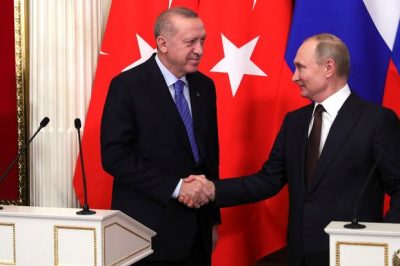Putin Saves Erdogan from Himself
Once again it was Russia that just prevented the threatened 'Muslim invasion' of Europe advertised by Erdogan

At the start of their discussion marathon in Moscow on Thursday, Russian President Vladimir Putin addressed Turkish President Recep Tayyip Erdogan with arguably the most extraordinary diplomatic gambit of the young 21st century.
Putin said:
“At the beginning of our meeting, I would like to once again express my sincere condolences over the death of your servicemen in Syria. Unfortunately, as I have already told you during our phone call, nobody, including Syrian troops, had known their whereabouts.”
This is how a true world leader tells a regional leader, to his face, to please refrain from positioning his forces as jihadi supporters – incognito, in the middle of an explosive theater of war.
The Putin-Erdogan face-to-face discussion, with only interpreters allowed in the room, lasted three hours, before another hour with the respective delegations. In the end, it all came down to Putin selling an elegant way for Erdogan to save face – in the form of, what else, yet another ceasefire in Idlib, which started at midnight on Thursday, signed in Turkish, Russian and English – “all texts having equal legal force.”
Additionally, on March 15, joint Turkish-Russian patrolling will start along the M4 highway – implying endless mutating strands of al-Qaeda in Syria won’t be allowed to retake it.
If this all looks like déjà vu, that’s because it is. Quite a few official photos of the Moscow meeting prominently feature Russian Foreign Minister Sergey Lavrov and Defense Minister Sergey Shoigu – the other two heavyweights in the room apart from both Presidents. In the wake of Putin, Lavrov and Shoigu must have read the riot act to Erdogan in no uncertain terms. That’s enough: now behave, please – or else face dire consequences.
The second Ataturk
A predictable feature of the new ceasefire is that both Moscow and Ankara – part of the Astana peace process, alongside Tehran – remain committed to maintaining the “territorial integrity and sovereignty” of Syria. Once again, there’s no guarantee that Erdogan will abide.
It’s crucial to recap the basics. Turkey is deep in financial crisis. Ankara needs cash – badly. The lira is collapsing. The Justice and Development Party (AKP) is losing elections. Former prime minister and party leader Ahmet Davutoglu – who conceptualized neo-Ottomanism – has left the party and is carving his own political niche. The AKP is mired in an internal crisis.
Erdogan’s response has been to go on the offensive. That’s how he re-establishes his aura. Combine Idlib with his maritime pretensions around Cyprus and blackmail pressure on the EU via the inundation of Lesbos in Greece with refugees, and we have Erdogan’s trademark modus operandi in full swing.
In theory, the new ceasefire will force Erdogan to finally abandon all those myriad al Nusra/ISIS metastases – what the West calls “moderate rebels,” duly weaponized by Ankara. This is an absolute red line for Moscow – and also for Damascus. There will be no territory left behind for jihadis. Iraq is another story: ISIS is still lurking around Kirkuk and Mosul.
No NATO fanatic will ever admit it, but once again it was Russia that just prevented the threatened “Muslim invasion” of Europe advertised by Erdogan. Yet there was never any invasion in the first place, only a few thousand economic migrants from Afghanistan, Pakistan and the Sahel, not Syrians. There are no “one million” Syrian refugees on the verge of entering the EU.
The EU, proverbially, will keep blabbering. Brussels and most capitals still have not understood that Bashar al-Assad has been fighting al Nusra/ISIS all along. They simply don’t understand the correlation of forces on the ground. Their fallback position is always the scratched CD of “European values.” No wonder the EU is a secondary actor in the whole Syrian tragedy.
I received excellent feedback from progressive Turkish analysts as I attempted to connect Erdogan Khan’s motivations with Turkey’s history and the empires of he steppes.
Their argument, essentially, is that Erdogan is an internationalist, but in Islamic terms only. Since 2000 he has managed to create a climate of denying ancient Turkish nationalist motives. He does use Turkishness, but as one analyst stresses, “he has nothing to do with ancient Turks. He’s an Ikhwani. He doesn’t care about Kurds either, as long as they are his ‘good Islamists.’”
Another analyst points out that, “in modern Turkey, being ‘Turkish’ is not related to race, because most Turkish people are Anatolian, a mixed population.”
So, in a nutshell, what Erdogan cares about is Idlib, Aleppo, Damascus, Mecca and not Southwest Asia or Central Asia. He wants to be “the second Ataturk.” Yet nobody except Islamists sees him this way – and “sometimes he shows his anger because of this. His only aim is to beat Ataturk and create an Islamic opposite of Ataturk.” And creating that anti-Ataturk would be via neo-Ottomanism.
Crack independent historian Dr Can Erimtan, whom I had the pleasure to meet when he still lived in Istanbul (he’s now in self-exile), offers a sweeping Eurasianist background to Erdogan’s dreams. Well, Vladimir Putin has just offered the second Ataturk some breathing room. All bets are off on whether the new ceasefire will metastasize into a funeral pyre.
*
Note to readers: please click the share buttons above or below. Forward this article to your email lists. Crosspost on your blog site, internet forums. etc.
This article was originally published on Asia Times.
Pepe Escobar is a frequent contributor to Global Research.
Featured image is from en.kremlin.ru

